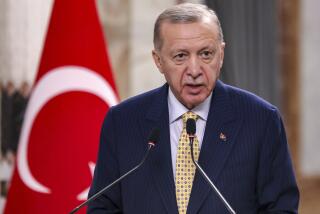EU Membership Draws Nearer as Turkey Yields
- Share via
ISTANBUL, Turkey — Saying they were at a historic crossroads, the European Union and Turkey resolved a final, contentious issue involving the Mediterranean island of Cyprus and formally agreed Friday to start membership negotiations next fall.
Looking weary but content, European and Turkish leaders meeting in Brussels announced that they had reached a compromise on Cyprus and cleared the way for talks to begin Oct. 3 that could eventually give the 25-nation bloc its first majority-Muslim member. The decision is a major breakthrough in Turkey’s 41-year quest to join the European community.
The EU proposed the October date Thursday, but said Turkey would have to signal de facto recognition of Cyprus’ Greece-backed government. Turkey supports a breakaway Turkish Cypriot government. After another day of often tense wrangling, Turkey relented Friday.
Turks here hailed the move closer to Europe and the stock market soared to a record high. Any joy was tempered, however, by the knowledge that full membership would not come for years, and only if Turkey continued its difficult efforts to bring its political and economic systems in line with European standards.
Moreover, some Turks, echoing widespread European opposition, remain skeptical that their poor nation of nearly 70 million really belongs in the EU.
Still, Turkish officials spoke Friday with relief.
Prime Minister Recep Tayyip Erdogan said the EU invitation validated his nation’s “silent revolution.”
“In just two years we have made deep-rooted and societal changes that many countries could not do in 10 years or 20 years,” he said at a news conference in Brussels. “We have achieved an extraordinary transformation as a nation.”
European Commission President Jose Manuel Barroso announced the compromise and the decision to open talks.
“Today is a new beginning for Europe and for Turkey,” he said. “The people of Turkey should rejoice in their new European history. Today we stand at a historical crossroads.”
The potential deal-breaker was Cyprus, which Turkey invaded in 1974 in response to a coup by Greek Cypriots attempting to unite the island with Greece. The island has been divided ever since. Only Turkey recognizes the breakaway northern Cypriot state, but the Greek Cypriot south is internationally recognized and became a member of the EU in May.
EU leaders said Turkey would have to acknowledge Cyprus to begin membership talks. Erdogan balked, and heated discussions continued well past midnight and through Friday morning, delaying for hours the final ceremonies of the summit.
Sources close to the talks said Erdogan turned to his aides at one point during negotiations and announced he was leaving. A panicked Dutch Prime Minister Jan Peter Balkenende, the summit chairman, asked Erdogan to at least permit Turkish Foreign Minister Abdullah Gul to remain. Erdogan refused and walked away, the sources said.
British Prime Minister Tony Blair was instrumental in finding a compromise, diplomats said.
“Blair played a phenomenal role soothing Turkish hysteria, drafting a compromise text and saving the Turks from making a historical mistake,” an EU diplomat said.
In the compromise, Turkey agreed to extend its association agreement, a 1963 protocol that established relations with the EU, to the 10 countries that joined in May, including Cyprus. As part of the deal, Balkenende agreed to state publicly that the gesture was not the same as full political recognition.
“It is not formal legal recognition, but it is a step that leads to progress in this field,” Balkenende said later.
Erdogan, at the news conference, said extending the protocol was a “technical” matter that “is in no way” recognition of Cyprus. He has to tread carefully in overtures to Cyprus because of opposition from his countrymen and, especially, the Turkish military. Still, Erdogan’s hand at home will be strengthened, and his popularity will grow, thanks to his success in Brussels.
The Cyprus troubles have stubbornly defied diplomacy for decades. The United Nations brokered a deal last spring to unify the north and south. Turkish Cypriots voted in favor of the deal but Greek Cypriots, under hardliner President Tassos Papadopoulos, rejected it. They were allowed to join the EU anyway, and the Turkish Cypriots were kept out.
Ever since, Cyprus has vetoed attempts by the EU to end economic sanctions against the Turkish Cypriot north as a reward for approving the U.N. plan. Turkey maintains 35,000 troops in the north.
The issue remains so sensitive that it bubbled over at the EU news conference announcing Friday’s deal.
When a Turkish journalist referred to recognition of “south Cyprus,” another journalist shouted at her. “South Cyprus, south Cyprus, what’s that? What is that?”
The talks that Turkey will enter in October can be derailed at any time if Ankara is seen as backsliding on political, human rights or economic reforms. However it goes, the negotiation is not expected to finish until 2015 at the earliest, when Turkey’s population is likely to exceed that of Germany, currently the bloc’s largest member.
“We are going to be sweating, gasping for breath during what will certainly be the toughest negotiations for any [EU] candidate country,” Mehmet Dulger, a ruling-party lawmaker, said in Ankara.
Conditions are especially tight on Turkey because of its size, its cultural differences, the fragility of its democracy and the weakness of its economy. Europeans fear being saddled with additional unemployed immigrants and worry about opening the door to a wave of radical Islam. But supporters say Turkey can serve as a buffer and bridge.
“[This] is an historic event,” Britain’s Blair told reporters. “It shows that those who believe there is some fundamental clash in civilizations between Christian and Muslim are actually wrong, that we can work together and we can cooperate together.”
Special correspondent Amberin Zaman in Ankara, Turkey, contributed to this report.
More to Read
Sign up for Essential California
The most important California stories and recommendations in your inbox every morning.
You may occasionally receive promotional content from the Los Angeles Times.














